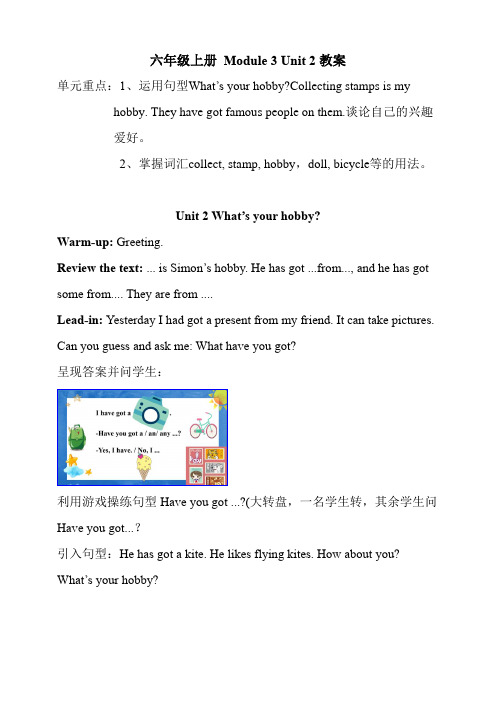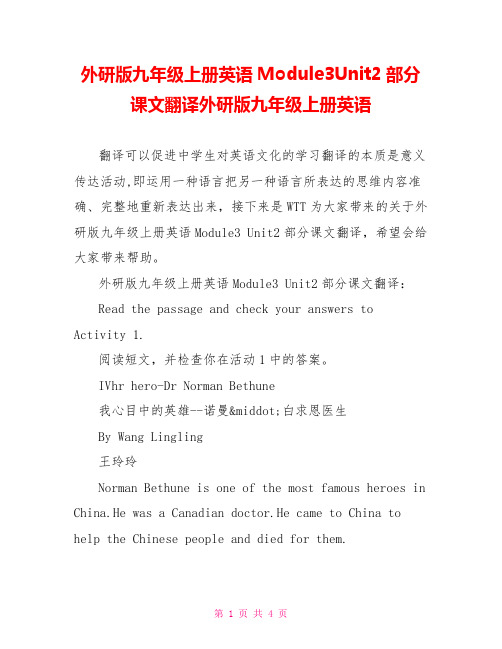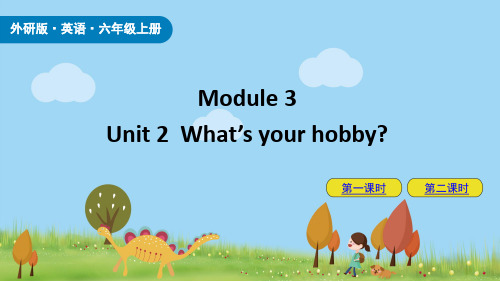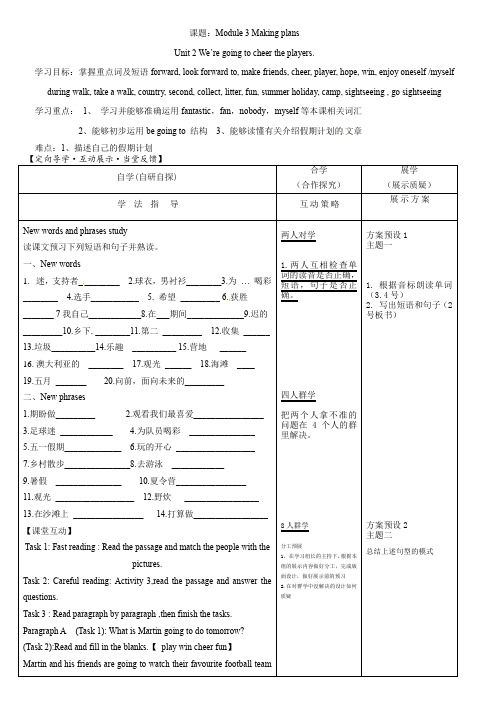Unit two Module 3
(西餐英语)Module Two Unit 3 Taking Orders点餐服务

• 零点餐(A La Carte)则是根据客人的选择提供菜式。
• 客人的选择与最大的灵活度,花费也比较高。
2、菜品组合原则
• 冷热兼顾 • 荤素合理 • 水陆兼备 • 软硬齐全 • 菜点经济 • 菜果相宜
“没有”,而是用另一种方法解释“卖完了” 。 4、如客人三心二意,拿不定主意,要运用语言技巧让客人尽
快下决定。
5、客人未到时,下单时注意叫起,赶时间的客人注意加急, 有特殊要求的客人注明(蒜、猪肉等)
6、海鲜写明做法、斤两,并向顾客确认。 7、台号、桌数写清楚,名字也一并写上。 8、点餐完毕以后应向客人复述一遍。 9、鱼的做法应写明。 10、急推菜品的推销(最大限度减少酒店的损失)
或厨师。(姓氏招呼,试问是否与上次一样,并推荐新品。
要求:富有面子、经济实惠、合乎口味、配套得体 • 面子菜特征:有气势、有典故、流行菜、稀罕菜、原料贵
、服务排场
点菜注意事项(一)
1、根据客人的心理需求尽力向客人介绍时令菜、特色菜、招 牌菜、畅销菜。
2、客人点菜过多或在原料、口味上重复时,及时提醒 。 3、客人已点菜估清时,及时告知并推荐相似菜,不要回答
或I would recommend xx to you. 如: I would recommend Fresh Tuna sashimi to you.
我向您推荐金枪鱼刺身。
介绍厨师推荐菜 XX is our chef’s recommendation.
特价菜 如果客人询问: What’s today’s special? Today’s special is xx, with a discount of 40 percent . 今天的特价菜是xx,有6折优惠.
小学英语外研版六年级上册《Module3Unit2》教案

六年级上册Module 3 Unit 2教案单元重点:1、运用句型What’s your hobby?Collecting stamps is my hobby. They have got famous people on them.谈论自己的兴趣爱好。
2、掌握词汇collect, stamp, hobby,doll, bicycle等的用法。
Unit 2 What’s your hobby?Warm-up: Greeting.Review the text: ... is Simon’s hobby. He has got ...from..., and he has got some from.... They are from ....Lead-in: Yesterday I had got a present from my friend. It can take pictures. Can you guess and ask me: What have you got?呈现答案并问学生:利用游戏操练句型Have you got ...?(大转盘,一名学生转,其余学生问Have you got...?引入句型:He has got a kite. He likes flying kites. How about you? What’s your hobby?Activity 1: What about Sam and Amy? 让学生带着问题看活动1视频并引出答案。
Is collecting ice cream Tom’s hobby? doll——doll sActivity 2: Today we are going to meet some new friends. Let’s have a look. Who are they?(介绍四个新朋友的名字)紧接着提出问题:What are their hobbies?学生带着问题观看视频并回答:听并跟读课文,接着呈现图片,教师先做用第一个Sue 做示范,引导学生进行复述。
外研版九年级上册英语Module3Unit2部分课文翻译外研版九年级上册英语

外研版九年级上册英语Module3Unit2部分课文翻译外研版九年级上册英语翻译可以促进中学生对英语文化的学习翻译的本质是意义传达活动,即运用一种语言把另一种语言所表达的思维内容准确、完整地重新表达出来,接下来是WTT为大家带来的关于外研版九年级上册英语Module3 Unit2部分课文翻译,希望会给大家带来帮助。
外研版九年级上册英语Module3 Unit2部分课文翻译:Read the passage and check your answers toActivity 1.阅读短文,并检查你在活动1中的答案。
IVhr hero-Dr Norman Bethune我心目中的英雄--诺曼·白求恩医生By Wang Lingling王玲玲Norman Bethune is one of the most famous heroes in China.He was a Canadian doctor.He came to China to help the Chinese people and died for them.在中国,诺曼·白求恩是最著名的英雄之一。
他是一名加拿大医生。
他来到中国帮助中国人民,并为他们而死。
Norman Bethune was born in 1890.He became a doctor in 1916 and went to Spain in 1936 to treat the wounded soldiers during the war there.He soon realised that many people were dying because they did not get to hospital quickly enough.Dr Bethune developed new ways of taking care of the sick.He invented special medical tools to use outside hospitals and close to the fighting areas so that doctors could treat the wounded more quickly.His inventions saved many lives.诺曼·白求恩出生于1890年。
外研版英语八年级上册Module3 Unit2 基础知识归纳

Unit2 基础知识归纳1.......we are going to play against another school next week.……我们下周将和另一个学校比赛。
句中against为介词,表示反对,对......对抗。
against常见用法如下:表示反对,其反义词为for。
若表示强烈反对,一般用副词strongly;经常同那些与之含义相关的动词连用。
如:fight, struggle, protest, argue, guard等。
Are you for or against the plan? 你对这个建议是赞成还是反对呢?The soldiers fought against the enemies bravely.士兵们勇敢地反抗敌人。
2. The practice starts at 10 am. We all arrive as early as we can so that we have time to warm up.训练上午10:00开始,我们尽可能早到,以便于有时间热身。
(1)as early as we can尽早;as...as sb. can=as...as possible.We should speak English as much as we can.=We should speak English as much as possible.(2)so that可引导目的状语从句,意为“以便,目的是”,此时so that后面从句中的谓语动词常和may, can, should等情态动词连用。
也可引导结果状语从句。
He got up very early so that he could catch the train.他起得很早以便能赶上火车。
(目的状语从句)He raised his voice, so that everyone heard him.他提高了声音,结果大家都听见了。
外研版(三起)六年级英语上册 Module 3 Unit 2 精品课件

Practise.
-What’s his hobby? - _P_la_yi_ng_b_a_sk_e_tb_a_ll is his hobby.
-What’s her hobby? - _L_is_t_en_in_g_to_m_u_s_ic_ is her hobby.
Homework
1.朗读并背诵第三模块第二单元活动一的句型。 2.预习活动二的课文。 3.试着用今天学习的句型说一说自己的爱好。
A: What’s your hobby? A: What’s your hobby? A: What’s your hobby?
B: _T_a_k_in_g_p_i_ct_u_r_e_s_is_ B: C_o_ll_e_c_ti_n_g_s_t_am__ps__is B: _F_ly_in_g__k_it_e_s_is___
Listen and circle.
1. Sue has got some dolls from Japan.
TF
2. Jack hasn't got any picture books.
TF
3. Taotao has got a dragon kite.
TF
4. Xiaoxue hasn't got a photo of her bicycle. T F
Teacher: Have you got any photos of your bicycle?
Xiaoxue: Yes. These are some photos of my new bicቤተ መጻሕፍቲ ባይዱcle.
Read in roles according to the following information.
外研版七年级英语下册 Module 3 Unit 2教案

课题:Module 3 Making plansUnit 2 We’re going to cheer the players.学习目标:掌握重点词及短语forward, look forward to, make friends, cheer, player, hope, win, enjoy oneself /myself during walk, take a walk, country, second, collect, litter, fun, summer holiday, camp, sightseeing , go sightseeing 学习重点:1、学习并能够准确运用fantastic,fan,nobody,myself等本课相关词汇2、能够初步运用be going to 结构3、能够读懂有关介绍假期计划的文章难点:1、描述自己的假期计划New words and phrases study读课文预习下列短语和句子并熟读。
一、New words1.迷,支持者_________2.球衣,男衬衫________3.为… 喝彩________ 4.选手___________ 5. 希望_________ 6.获胜_______ 7我自己____________8.在___期间_____________9.迟的_________10.乡下. ________11.第二_________ 12.收集______13.垃圾__________14.乐趣__________ 15.营地______16.澳大利亚的________ 17.观光______ 18.海滩____19.五月_______ 20.向前,面向未来的_________二、New phrases1.期盼做_________2.观看我们最喜爱________________3.足球迷____________4.为队员喝彩_______________5.五一假期_____________6.玩的开心__________________7.乡村散步_______________8.去游泳____________9.暑假_______________ 10.夏令营________________11.观光__________________ 12.野炊_________________13.在沙滩上________________ 14.打算做_________________【课堂互动】Task 1: Fast reading : Read the passage and match the people with thepictures.Task 2: Careful reading: Activity 3,read the passage and answer thequestions.Task 3 : Read paragraph by paragraph ,then finish the tasks.Paragraph A(Task 1): What is Martin going to do tomorrow?(Task 2):Read and fill in the blanks.【play win cheer fun】Martin and his friends are going to watch their favourite football team趁热打铁:Paul looks forward to _____his pen pal. ( meet ) 2.wear , dress, (be)in , put on 的区别 趁热打铁: I don’t like _____ hats. The boy can ____himself.Do you know the girl ___red? 4.It’s cold.________your coat. 3.cheer 意为______. 常见短语:cheer sb.___________ cheer sb. up___________cheer sb. on_____________注意:cheer up 和cheer on ,当代词为宾语的时候,要放在cheer 与 up/on 中间.We should cheer ourselves up ._____________ They beat drums to cheer on the players.______________ The children are cheering their running classmates.________ cheer 做名词,意为:欢呼声、喝彩声,复数为______. cheers 单独使用时意为“干杯”,是感叹词。
(三起点)外研版五年级英语上册《Module3_Unit2_教学课件》
Homework
1. 按照正确的语音、语调朗读课文对 话。 2.向家人介绍你所采访的同学的周末 活动。 3. 预习Module4 Unit1。
close
Listen and read.
Daming and his father went to the Great Wall at the weekend.
>> Presentation
Listen and read.
(单击图片可播放动画)
>> Presentation
Listen and read.
They arrived there at ten o’clock in the morning.
They walked on the wall for one hour.
>> Presentation
Listen and read.
They took photos of the mountains with beautiful flowers and green plants.
box
walk football food
>> Practise
Make funny sentences.
>> Practise Do and say. Make a survey of trips.
>> Consolidation
Sing a song
(单击图片可播放动画)
Summary
询问和陈述过去的行为 A: Where did you go? B: I/We .... A: How did you go there? B: I/We went there ...
第四册 Module3 Unit 2
4.朗读课文(跟读-自读-小组分角色读)
5.模仿操练:
(1).教师出示图片,学生看图,小组合作操练以上句型,
然后操练课文第一部分。要求学生两人小组练习对话。
(2).请小组上台展示句型。
四、评价总结,结束。
五、家庭作业
(1)读课文三遍。
通讯地址:山东省潍坊市峡山生态经济发展区泛海希望小学
1995年参加工作,一直担任小学高年级英语教学工作。工作中认真扎实,勤于耕耘,不断进取。任教期间,曾多次参加课堂比武大赛,并取得了优异成绩。
发展目标:培养学生的听说读的能力。
三、教材分析
本课是新标准英语三年级起点第四册Module 3 Unit 2 On Monday I’ll go swimming .是在第一单元的基础上继续巩固和学习将来时态will的使用,以及星期的学习,让学生们学会用英语来做一周计划。
四、教学方法
在教学时我首先利用自由会话来复习上一节课的内容,同时为本节课继续学习一般将来时作好铺垫。学习单词利用单词卡片,形象直观。同时利用学生听录音,小组展示等多种形式来巩固单词。学习课文采用让学生先熟悉课文中的重点短语,为学习课文扫清障碍。设计听力练习让进一步熟悉课文内容,同时锻炼学生听的能力。学生看图操练句型,提高了学生的学习兴趣。
3.学生通过学习能用句型On Monday I’ll go to swimming.表达自己一周的计划。
4.能用Will you…?提问对方是否将要做某事并用Yes, I will. No,I won’t.进行简单回答。
情感态度:
1.学生通过上网了解星期名称的由来,了解西方文化,培养跨文化意识。
2、教育学生制定合理、科学的学习活动计划,懂得安排时间,珍惜时间,养成有计划做事情的习惯。
外研三起四年级下册英语Module3Unit2教案
外研三起四年级下册英语Module3 Unit 2 教案教学内容:本课为外研三起四年级下册英语Module3 Unit 2的内容。
主要围绕家庭成员的介绍展开,包括爸爸、妈妈、哥哥、姐姐等家庭成员的单词学习,以及相关的句型。
同时,本课还涉及到家庭成员职业的介绍,如医生、教师等。
教学目标:1. 知识与技能:学生能够听懂、会说、会读本课单词和句型;能够运用所学单词和句型介绍自己的家庭成员及职业。
2. 过程与方法:通过图片展示、游戏互动等方式,让学生在轻松愉快的氛围中学习英语,提高学生的听说能力和语言运用能力。
3. 情感态度价值观:培养学生对家庭的热爱和尊敬,激发学生学习英语的兴趣和自信心。
教学难点:1. 学生对于家庭成员单词的记忆和运用。
2. 学生对于家庭成员职业的介绍和句型的运用。
教具学具准备:1. 教具:多媒体课件、图片、卡片等。
2. 学具:学生用书、练习册、彩笔等。
教学过程:1. 导入:通过播放英文歌曲,营造英语氛围,激发学生学习兴趣。
然后展示家庭成员的图片,引导学生用英语进行描述,复习已学的家庭成员单词。
2. 新课呈现:利用多媒体课件呈现本课的单词和句型,通过图片和声音的结合,让学生更好地理解和记忆。
同时,进行角色扮演,让学生在模拟情境中运用所学知识。
3. 活动练习:设计各种游戏和练习,让学生在游戏中巩固所学知识,提高学生的听说能力和语言运用能力。
例如,家庭成员接龙、家庭成员职业猜谜等。
5. 作业布置:布置相关的练习题和课后任务,让学生在课后进行巩固和复习。
板书设计:1. 在黑板上画出家庭成员的图片,旁边标注对应的英文单词。
2. 列出本课的主要句型,并进行示范和讲解。
3. 在黑板的一角设置“Word Wall”,将本课的单词和句型写在卡片上,贴在墙上,供学生随时查看和学习。
作业设计:1. 听力练习:听录音,选择正确的家庭成员单词。
2. 口语练习:用英语介绍自己的家庭成员及职业。
3. 写作练习:写一篇短文,介绍自己的家庭成员及职业。
外研版英语五年级下册《 Module 3 Unit 2》教学课件
very much 常用于修饰动词,放在“做某事”的后面。
例 句
I want a new bike very much.
Try to practise. very very much
1. I want to eat fish very much tonight. 2. The fish is very delicious. 3. I lost my book. I’m very sad. 4. This is my new bike. I like it very much .
外研版·英语·五年级下册
Module 3 Unit 2 Sam ate four hamburgers.
第一课时
第二课时
第一课时
an egg
eggs
a hamburger
hamburgers
eat
ate
drink
drank
give
试着说出下列动词的过去式。 Do you know?
have/has eat drink give
(因此他现在没有食物了。)
Listen and read.
He ate all the fish and he ate
all the meat.
So he has got no food now.
A: What did you eat last night? B: I ate…
cheese
fish
had ate drank gave
不规则形式
What did the cat eat?
Look, listen and say.
What did the cat eat?
- 1、下载文档前请自行甄别文档内容的完整性,平台不提供额外的编辑、内容补充、找答案等附加服务。
- 2、"仅部分预览"的文档,不可在线预览部分如存在完整性等问题,可反馈申请退款(可完整预览的文档不适用该条件!)。
- 3、如文档侵犯您的权益,请联系客服反馈,我们会尽快为您处理(人工客服工作时间:9:00-18:30)。
1 Unit two Module 3 Vocabulary 1. 由…组成(构成) be made up of = be composed of consist of…(无被动和进行时) e.g. Great Britain is made up of/ compose of England, Scotland and Wales. Great Britain consist of England, Scotland and Wales.
be made from/of指成品与材料的关系,“由--制成” e.g. Wine is made from grapes. The desk is made of wood.
2. occupy vt. ① 占领to enter a place in a large group and take control of it, especially by military force The enemy soon occupied the town. ② 占用(空间、面积、时间等)to fill up or use time or space Reading occupies most of my free time. The bathroom is occupied. ③ 居住to live or stay in a place The Smiths have occupied this apartment for the past five months. ④ 使忙于(做某事);使从事to fill your time or keep you busy doing something be occupied with sth./ in doing… 忙于…,从事…,专心于… She is occupied in aiding people with disability.. He occupied himself with various research projects. ⑤ 担任(职务)to have an official job or position He occupies an important position in the Ministry of Education. occupant n. 居住者,占有人 occupancy n. (formal)占有,占用 occupation n. [U] 占领;占用,居住. [C] 工作,职业;消遣,业余活动 e.g. The Japanese occupation of Taiwan lasted 51 years. There’s no evidence of human occupation. The enemy was in occupation of my hometown.(比较be in the occupation of) Please state your name, address and occupation before formal interview. He is a teacher by occupation.职业上 (his occupation is a teacher. 错) Riding is her favorite occupation.
3. consist vi. The committee consists of ten members. consist of doing sth. His job consists of helping old people who live alone. 他的工作包括帮助无人照顾的独居老人。 consist in 在于,存在于 The beauty of the city consists in its building.
4. mixture n. 混合;混合体 Air is a mixture of gases. 2
The talk was conducted in a mixture of English, Chinese and French. His first reaction was a strange mixture of joy and anger. (感情的)混杂
5. name sb. after =give someone the same name as Bill is named after his father.
6. aside adv.(用于名词后)除…以外used to show what you’ve just said is not as important as you are going to
say next e.g. These problems aside, we think the plan should go ahead. He stood aside to let me pass. Swimming is easier if you put your fears aside. Put money aside for a rainy day. [比较] besides, in addition to 包括所说的人或物 except(同类), except for(不同类), except that 不包括所说的人或物 aside from= apart from 可以包括,也可不包括 Aside from English, he has a good command of Russian and French.(= besides) He has no interests, aside from his work.(= except ) It’s a good paper, aside from a few spelling mistakes.(= except for)
7. contribution n. 捐款;贡献,促成因素;捐赠;稿件,投稿 e.g. We are asking for contribution to disaster relief. The Chinese people ought to make a greater contribution to mankind. ( make contributions to) All the money has been raised by voluntary contribution. This week’s issue has contributions from several well-respected journalists. contribute v. contribute…to…捐赠;投稿 contribute to 促成,是…的原因之一 e.g. The writer personally contribute £5,000 to the earthquake fund. She contributed a number of articles to the magazine. All these factors contributed to his success. I’m sure your suggestion will contribute to solving the problem.
8. defeat vt. 击败,战胜 to win against sb. in a war, competition, sports game etc. The French defeated the English troops. n. 失败 The government has suffered a serious defeat. Sh’s told him she won’t marry him, but he’ll never admit defeat.
9. take control of under control in control 控制 lose control of out of control beyond control 失去控制 be in control of 控制…,掌握… be in the control of 在…的控制、掌握之下
10. lead to 导致; 通往 Smoking can lead to lung cancer. All roads lead to Rome. 3
11. replace vt. replace … with… e.g It is not a good idea to replace meals with snacks. It must be replaced with/by a new one. Electric lights have replaced candles. ( take place of ) She replaced the receiver. ( put sth. back)
12. raise vt. If you know the answer, just raise your hand. 举起 I have to raise my voice to draw your attention. 提高,增加 I was raised by my grandparents. 养育,培养 This question was raise at the meeting. 提及,提出 We raise money/funds for charity by holding a bazaar. 筹集(资金) The plans for the new development have raised angry protests from locals. 引起,激起
13. therefore adv. 因此, 所以 Therefore,we must learn English well. 放在句首用逗号隔开 Many fast food restaurant, therefore, have red furniture or walls. 放在句中作插入语 These birds are very beautiful and therefore liked by many people. 连接两个分句
14. process n. 过程,进程;工序,制作流程 I will tell you, sooner or later, all the complicated process. 我早晚要将整个复杂过程告诉你。 They are using a new process to make glass. be in the process of (doing) sth. 在…过程中 e.g. The car is in the process of repair. The company is in the process of moving to new offices. vt. 加工;(用电脑)处理 e.g. Supermarkets sell many vegetables that have been processed. The information is being processed. vi. 列队行进;缓缓前进 to walk or move along slowly in, or as if in, a procession
